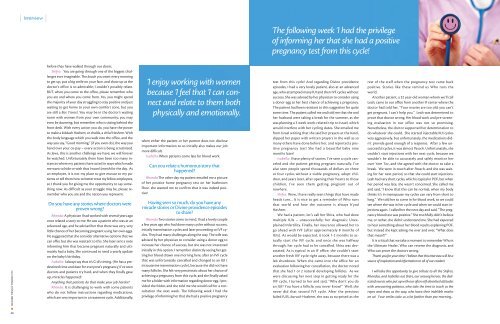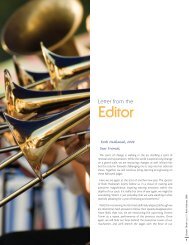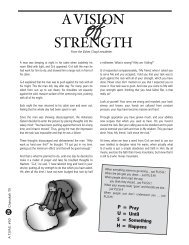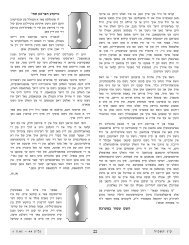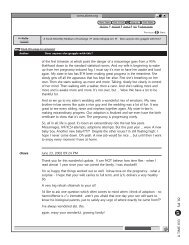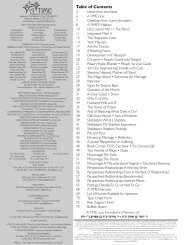Rosh Hashanah 5773 - Jewish Infertility
Rosh Hashanah 5773 - Jewish Infertility
Rosh Hashanah 5773 - Jewish Infertility
- No tags were found...
You also want an ePaper? Increase the reach of your titles
YUMPU automatically turns print PDFs into web optimized ePapers that Google loves.
Chizukrabbi Yoni PosnickSHaarei TikvaH/ TiSHrei <strong>5773</strong>Man must do his part, but the outcome is, plainly andsimply, the cheshbon of Hashem.25SHaarei TikvaH/ TiSHrei <strong>5773</strong>There is a constant tightrope walk between bitachonand hishtadlus, and this crucial cheshbon comes to theforefront in the challenges we face.On one hand, we must make proper hishtadlus. On theother hand, we must live with the real bitachon that it isnot what we do that will bring about a yeshuah for us; thatis solely from Hashem. There are situations that may reflecta lack of hishtadlus, such as not putting effort into treatment,and others that reflect a lack of bitachon, such as tryingto take everything into our control. One must investboth hishtadlus and bitachon, and one cannot cross the lineeither way.The Midrash tells of rabi Chanina, who wished morethan anything to give something to the Bais Hamikdosh.Poor and impoverished as he was, he could not afford anythinghe felt worthwhile to give. One day, while walking ona road, he came across an impressive looking stone. This,he felt, would make a fitting donation to the house ofHashem. The stone’s size and weight made it impossible tocarry alone, so he tried hiring workers to lift the stone andtake it to Yerushalayim. For such a stone, however, the priceHishtadlusVs. Bitachonfor lifting and transporting was more than he could afford.at that moment, five workers came by and offered to transportthe stone for him on the condition that he put hishands under the stone and help them lift and carry it. rabiChanina agreed. He bent down and put his hands underthe stone, ready to lift it, and suddenly, they were miraculouslyin Yerushalayim and the five “men” were nowhere tobe seen! These were no ordinary individuals, but angels sentby Hashem, Who saw rabi Chanina’s pure-hearted desireto give to the Bais Hamikdosh.The glaring question is that if the “men” were really angelsin disguise sent by Hashem, why was it necessary forhim to put his hands under the stone and help them lift it?The answer is that, yes, Hashem is running the show and allthat occurs is from Him, but He wishes for us to be involved,to devote our sincere efforts and energy- and then(and only then) does He bless our efforts. Hashem says, “iwill help you and reward your sincere efforts, but you mustput your hands under the stone.” We must roll up oursleeves and put in real work. Then we are assured of Divineblessing.One who looks in the Torah notices that the first wordof Parshas Vayikra is spelled with a small Alef. The Baal Haturimexplains that Moshe rabbeinu wanted to leave outthe Alef and write the word as “vayikar,” which wouldmean, “Hashem happened to speak to Moshe.” Mosherabbeinu, in his great anivus, did not want to attract honorthat Hashem specifically called to him. He wanted to makeit seem as if he just happened to hear Hashem’s call.Hashem, however, did not agree and instructed Moshe towrite the Alef as well.Why was Hashem so insistent that Moshe add the Alef?The answer is because of the profound message containedin that little Alef, which changes the word completely from“Vayikar,” meaning that it just happened, to “Vayikra,”meaning that Hashem, unmistakably, specifically, and personallycalled to Moshe. Vayikra tells us that there’s no “itjust happened.” Hashem is involved and sends a call toevery individual. every action, feeling, and event is shapedby Hakadosh Baruch Hu. it is this lesson which serves tostrengthen our bitachon that could not be left out.it is not just that a person was “in the right place at theright time.” it is not a person’s personal efforts, prowess,wisdom, or resources that caused a result. Man must do hispart, but the outcome is, plainly and simply, the cheshbonof Hashem. This is an unforgettable lesson which must becarried with us to every appointment and through everytest. Our calls, actions, and effort are necessary and cannotbe overlooked. But none of those things will or will notbring about success. While we may go to doctors, spendenormous amount of money, and push ourselves beyondendurance (and one cannot slack off or simply put thingson the back burner), none of those things will bring us achild. it’s only when Hashem decides to bless our genuineefforts that we will be helped.i recently read an incredibly powerful line from rav MatisyahuSalomon, which sums up this very idea: We need toput less faith in our efforts and more efforts in our faith. Certainly,both our efforts and our faith are expected andneeded. But we must keep proper perspective and understandthat our “hands under the stone” aren’t going tomove it anywhere. The only way we can get from “Point a”to “Point B” is through Hashem’s assistance and blessing.“Vayikra.” Hashem is intimately and personally involvedin our lives and our efforts. Through every form of hishtadluswe make, remember the Alef, which represents Hashemis behind the scenes and at our sides.May Hashem, the Borei Nefashos, bless our efforts andreward our growing faith in Him.Reprinted and slightly revised with permission from the Yated Ne’eman“We need to put less faith in our efforts,and more efforts in our faith.Harav Matisyahu Salomon24


